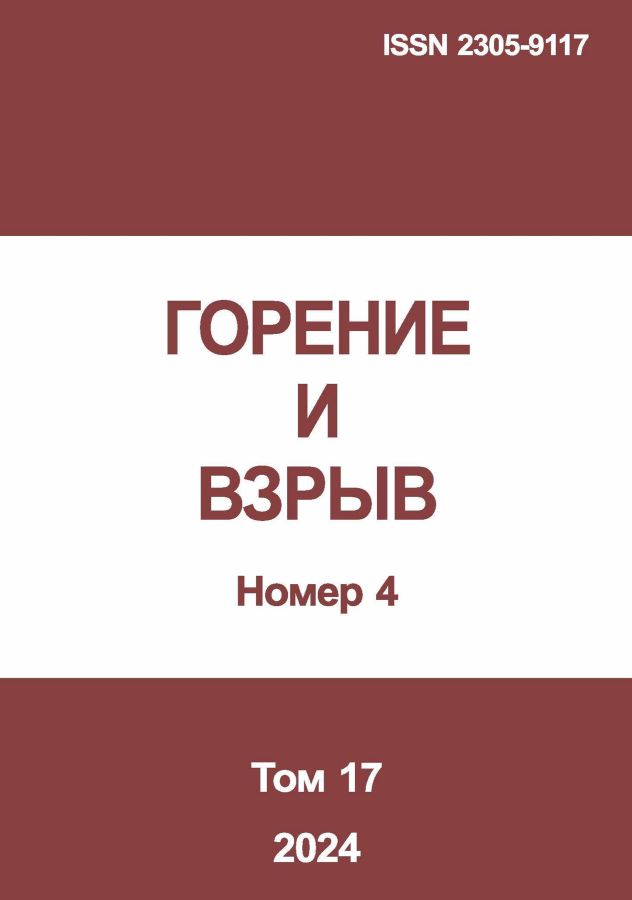Измерение расходных характеристик проточного газогенератора при газификации легкоплавких материалов в низкотемпературном потоке воздуха
- Авторы: Внучков Д.А.1, Звегинцев В.И.1, Наливайченко Д.Г.1, Фролов С.М.2,3
-
Учреждения:
- Институт теоретической и прикладной механики им. С. А. Христиановича СО РАН
- Федеральный исследовательский центр химической физики им. Н. Н. Семенова Российской академии наук
- Национальный исследовательский ядерный университет «МИФИ»
- Выпуск: Том 14, № 3 (2021)
- Страницы: 43-60
- Раздел: Статьи
- URL: https://bakhtiniada.ru/2305-9117/article/view/288582
- DOI: https://doi.org/10.30826/CE21140306
- ID: 288582
Цитировать
Аннотация
Предложена методика экспериментального определения расходных характеристик проточного газогенератора, работающего на газификации твердого легкоплавкого материала (ТЛМ) набегающим потоком воздуха. Проведены экспериментальные исследования газификации заряда полипропилена (ПП). В экспериментах выход продуктов газификации составил от 43 до 120 г/с, а соотношение расходов воздуха и продуктов газификации ПП составило 2,3–2,9. Выполнен анализ погрешностей при использовании методики в реальных экспериментах.
Об авторах
Дмитрий Александрович Внучков
Институт теоретической и прикладной механики им. С. А. Христиановича СО РАН
Автор, ответственный за переписку.
Email: vnuchkov@itam.nsc.ru
кандидат технических наук, младший научный сотрудник
Россия, НовосибирскВалерий Иванович Звегинцев
Институт теоретической и прикладной механики им. С. А. Христиановича СО РАН
Email: zvegin@itam.nsc.ru
доктор технических наук, главный научный сотрудник
Россия, НовосибирскДенис Геннадьевич Наливайченко
Институт теоретической и прикладной механики им. С. А. Христиановича СО РАН
Email: denis@itam.nsc.ru
кандидат технических наук, научный сотрудник
Россия, НовосибирскСергей Михайлович Фролов
Федеральный исследовательский центр химической физики им. Н. Н. Семенова Российской академии наук; Национальный исследовательский ядерный университет «МИФИ»
Email: smfrol@chph.ras.ru
доктор физико-математических наук, руководитель отдела, главный научный сотрудник Федерального исследовательского центра химической физики им. Н.Н. Семенова Российской академии наук; профессор Национального исследовательского ядерного университета «МИФИ»
Россия, Москва; МоскваСписок литературы
- Кондратова О. А. Исследование рабочих процессов твердотопливных газогенераторов подушек безопасности: Автореф. дис. ... канд. физ.-мат. наук. — Томск, 2007.
- Karabeyoglu A., Zilliac G., Cantwell B. J., DeZilwa S., Castellucci P. Scale-up tests of high regression rate paraffin-based hybrid rocket fuels // J. Propul. Power, 2004. Vol. 20. P. 1037–1045.
- Encinar J. M., González J. F. Pyrolysis of synthetic polymers and plastic wastes. Kinetic study // Fuel Process. Technol., 2008. Vol. 89. P. 678–686.
- Aboulkas A., El harfi K., El Bouadili A. Thermal degradation behaviors of polyethylene and polypropylene. Part I: Pyrolysis kinetics and mechanisms // Energ. Convers. Manage., 2010. Vol. 51. P. 1363–1369.
- Mazzetti A., Merotto L., Pinarello G. Paraffin-based hybrid rocket engines applications: A review and a market perspective // Acta Astronaut. 2016. Vol. 126. P. 286–297.
- Srivastava Diksha. Advances in biofuel technology: A review // IOSR J. Engineering, 2021. Vol. 11. Iss. 4. P. 32–41.
- Rashkovskiy S. A., Yakush S. E. Numerical simulation of low-melting temperature solid fuel regression in hybrid rocket engines // Acta Astronaut., 2020. Vol. 176. P. 710–716. doi: 10.1016/j.actaastro.2020.05.002.
- Salgansky E. A., Lutsenko N. A. Effect of solid fuel characteristics on operating conditions of low-temperature gas generator for high-speed flying vehicle // Aerosp. Sci. Technol., 2021. Vol. 109. Article No. 106420.
- Бобров А. Н., Ягодников Д. А., Попов И. В. Воспламенение и горение двухкомпонентной газовзвеси порошкообразных горючего и окислителя // Физика горения и взрыва, 1992. Т. 28. № 5. С. 3–7.
- Глотов О. Г., Ягодников Д. А., Воробьев В. С., Зарко В. Е., Симоненко В. Н. Воспламенение, горение и агломерация капсулированных частиц алюминия в составе смесевого твердого топлива. Экспериментальные исследования агломерации // Физика горения и взрыва, 2007. Т. 43. № 3. С. 83–97.
- Красильников А. В., Макаревич Г. А., Михайлов А. В. Стенд для экспериментального исследования сверхзвукового горения углеводородных топлив // Космонавтика и ракетостроение, 2008. № 1(50). С. 35–42.
- DeLuca L. T., Galfetti L., Colombo G., Maggi F., Bandera A., Boiocchi M., Gariani G., Merotto L., Paravan C., Reina A. Time-resolved burning of solid fuels for hybrid rocket propulsion // Progress in propulsion physics / Eds. L. DeLuca, C. Bonnal, O. Haidn, S. Frolov. — EUCASS advances in aerospace sciences book ser. — EDP Sciences – TORUS PRESS, 2011. Vol. 2. P. 405–426.
- Шабунин А. И., Калинин С. В., Сарабьев В. И., Ягодников Д. А., Полянский А. Р. Результаты исследования и разработки низкотемпературных быстрогорящих газогенерирующих топлив для систем перемещения элементов исполнительных механизмов // Наука и образование, 2012. № 02. 13 с. http://technomag.edu.ru/doc/299736.html.
- Wang L. H., Wu Z. W., Chi H. W., et al. Numerical and experimental study on the solid-fuel scramjet combustor // J. Propul. Power, 2015. Vol. 31. No. 2. P. 685–693. doi: 10.2514/1.B35302.
- Lv Zhong, Xia Zhi-xun, Liu Bing, Huang Li-ya. Preliminary experimental study on solid-fuel rocket scramjet combustor // J. Zhejiang University — SCIENCE A, 2017. Vol. 18. No. 2. P. 106–112.
- Shiplyuk A. N., Zvegintsev V. I., Frolov S. M., Vnuchkov D. A., Kiseleva T. A., Kislovsky V. A., Lukashevich S. V., Melnikov A. Yu., Nalivaychenko D. G.. Gasification of low-melting hydrocarbon material in the airflow heated by hydrogen combustion // Int. J. Hydrogen Energ., 2020. Vol. 45. Р. 9098–9112.
- Shiplyuk A. N., Zvegintsev V. I., Frolov S. M., Vnuchkov D. A., Kislovsky V. A., Kiseleva N. A., Lukashevich S. V., Melnikov A. Yu., Nalivaychenko D. G. Gasification of low-melting fuel in a high-temperature flow of inert gas // J. Propul. Power, 2021. Vol. 31. No. 1. P. 20–28. doi: 10.2514/1.B37780.
- Архипов В. А., Басалаев С. А., Кузнецов В. Т., Порязов В .А., Федорычев А В. Моделирование процессов зажигания и горения борсодержащих твердых топлив // Физика горения и взрыва, 2021. Т. 57. № 3. С. 58–64. doi: 10.15372/FGV20210305.
- Zarko V., Perov V., Kiskin A., Nalivaichenko D. Microwave resonator method for measuring transient mass gasification rate of condensed systems // Acta Astronaut., 2019. Vol. 158. P. 272–276. doi: 10.1016/j.actaastro.2019.03.028.
- Evans B. N., Favorito A., Kuo K. Study of solid fuel burning-rate enhancement behavior in an X-ray translucent hybrid rocket motor. AIAA Paper No. 2005-3909, 2005. doi: 10.2514/6.2005-3909.
- Звегинцев В. И. Газодинамические установки кратковременного действия. Часть 1. Установки для научных исследований. — Новосибирск: Параллель, 2014. 551 с.
- Трусов Б. Г. Моделирование химических и фазовых равновесий при высоких температурах «Астра 4». — М.: Изд-во МГТУ им. Н. Э. Баумана, 1991. 40 c.
Дополнительные файлы










